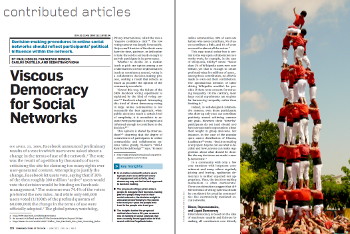"Viscous Democracy" for Social Networks
Decision-making procedures in online social networks should reflect participants' political influence within the network.
 Direct-democracy voting in large online communities may not be the best choice. The degree of commitment of different participants in online communities and collaboration systems varies greatly. In a community in which there are a few core members with long-term commitments to the project, and many other members joining and leaving the project rapidly, egalitarian democracy is neither expected nor appropriate. Thus, the decision-making mechanism is often meritocratic.
Direct-democracy voting in large online communities may not be the best choice. The degree of commitment of different participants in online communities and collaboration systems varies greatly. In a community in which there are a few core members with long-term commitments to the project, and many other members joining and leaving the project rapidly, egalitarian democracy is neither expected nor appropriate. Thus, the decision-making mechanism is often meritocratic.
In this work, we propose a middle-ground between direct democracy (citizens vote on every issue) and representative democracy (citizens elect representatives that decide on their behalf on every issue). Our proposal, a type of delegative democracy, allows them to express their opinion directly or to delegate their power on a proxy.
Proxy delegation can be transitive: a proxy can delegate in another proxy. However, as our vote travels farther away through a delegation chain, we would like to introduce some reluctance in the way the power is transferred to other people we may not know directly. In that sense, we include a dampening factor (like PageRank does) to reduce the amount of power delegated through long chains. Technically, our system of viscous democracy is a system of transitive proxy voting with exponential damping.
Details appear in the virtual extension of the June 2011 issue of Communications of ACM: Viscous Democracy for Social Networks, by Paolo Boldi, Francesco Bonchi, Carlos Castillo and Sebastiano Vigna.


